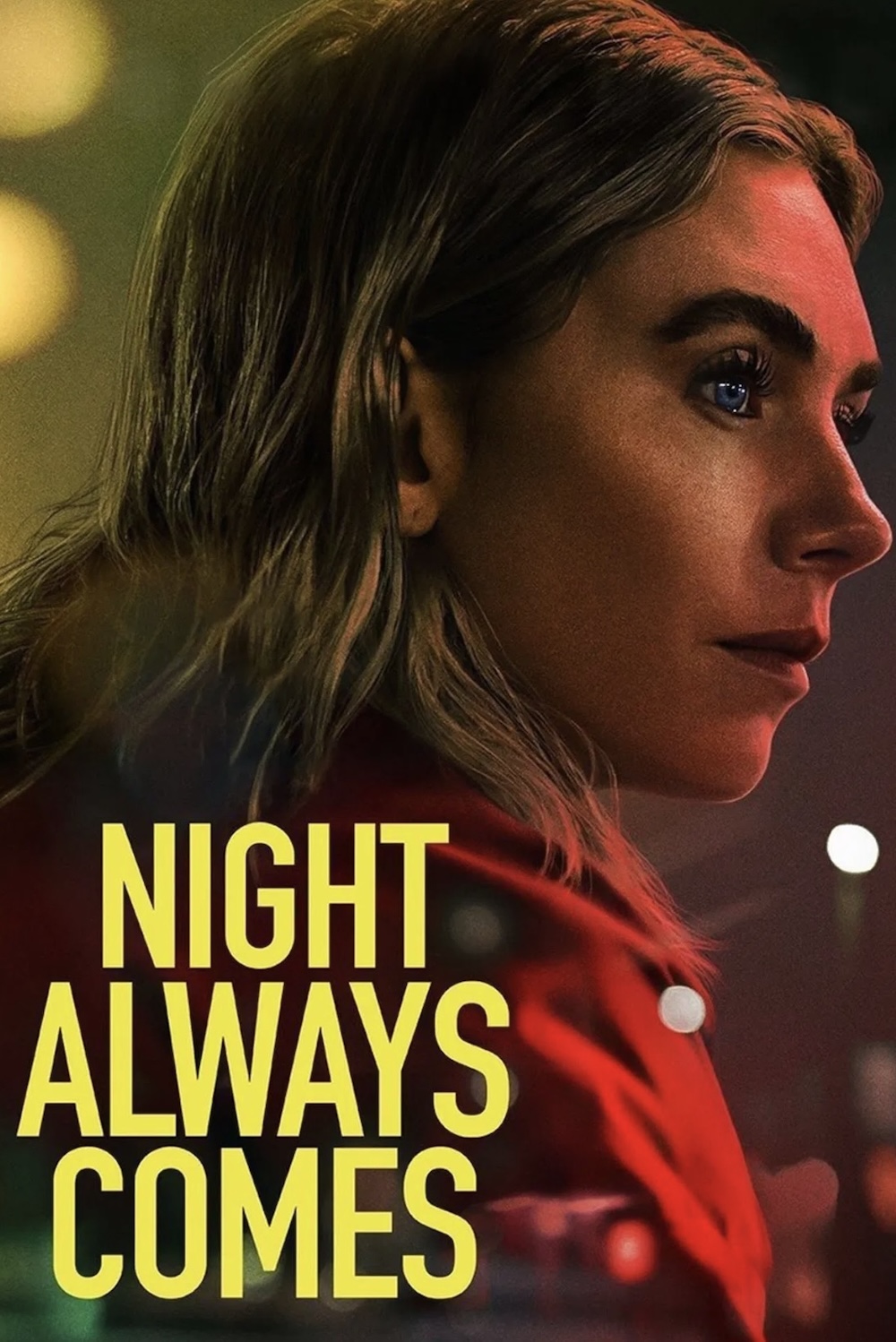NIGHT ALWAYS COMES (2025)
Risking everything to secure a future for herself and her brother, a woman confronts her own dark past over the course of one night.

Risking everything to secure a future for herself and her brother, a woman confronts her own dark past over the course of one night.

Adapted from a 2021 novel by musician and author Willy Vlautin, Night Always Comes—the title removes the preposition from Vlautin’s title, The Night Always Comes, for some reason; I guess without it, the title seems more pacy and cinematic to dullards—is a Netflix Original written by Sarah Conradt, directed by Benjamin Caron, and starring Vanessa Kirby (The Fantastic Four: First Steps). It’s a film “for our times,” by which I mean it purports to explore pressing social issues and not just provide cheap thrills. Sort of halfway between Cathy Come Home, a 1963 BBC TV play about homelessness that changed the conversation on that topic, and, well, a crime thriller.
Lynette (Kirby) is a troubled young woman living with her useless mother Doreen (Jennifer Jason Leigh) and brother Kenny (Zack Gottsagen), an aspiring rapper with Down syndrome. (Gottsagen himself is an actor and rapper who has the genetic disorder.) Lynette is angling to buy the house they live in and in which both she and Kenny grew up, but rather than show up at the estate agent’s office to co-sign the documents, Doreen spends the $25,000 earmarked for the purchase on a new car. Facing eviction in the morning unless she can somehow replace that money, Lynette, working multiple jobs as well as doing sex work on the side, goes on a journey through the night to beg, borrow, and steal another 25 grand, placing her at the mercy of dangerous criminals along the way.

The film is set in Portland, Oregon, among the working poor and underclass, in landscapes of urban life that feel gritty and disheartening even in their richer quarters. Lynette has a friend, Gloria (Julia Fox), from whom she tries to reclaim money owed and who lives in a high-rise, glass-walled apartment that feels curiously featureless. Paid for by a politician with whom Gloria has a transactional relationship, it has Post-it notes with affirmational phrases stuck to a vanity mirror, yet no warmth permeates this space. Gloria talks increasingly about how her (lover? client? both?) will cast her out into the street if she brings him trouble.
It speaks to the overall theme of the film, which evokes a late-stage capitalist America where kindness and charity exist as rare and hunted things, where even people inclined to kindness are forced to exploit one another by their desperate need. Director Caron paints this world with skill and power, using light and colour as night descends to create that sadly beautiful atmosphere of cities during this time, with neon reflected on the characters’ faces. I was reminded a little of the doughnut shop stickup in Paul Thomas Anderson’s Boogie Nights (1997) and the transgender sex work dramedy Tangerine (2015), both also set in American cities that are grubby and exploitative yet also visually captivating.

Stephan James shows up as one of the more complex characters, Cody, a colleague of Lynette’s from the bar where she works. A dynamic evolves between them when she asks him for help cracking a safe, and he asks why she thinks that he’d know about such things. The implication, of course, is that Lynette thinks this because Cody is Black. The film doesn’t rest on this easy interpretation of her actions, however. It could have performed a simplistic bit of finger-wagging along these lines, a la Crash (2004), the retrospectively embarrassing ‘Best Picture’ winner that purported to grittily satirise race in Los Angeles, and ended up suggesting that racist police officers who antagonise Black motorists and molest their wives might be one good deed away from redemption. Night Always Comes avoids insulting parable and suggests that Lynette’s decision to approach Cody is based not on race, but rather an instinctive sympathy for someone else on the fringes of society.
The film is, nonetheless, far from perfect, and its momentary subtlety is undercut by a ludicrous general plot and artistic elements that feel imposed by the “Netflix Original” genre. To put it bluntly, it just never makes sense that Lynette wouldn’t be tracked down and murdered by criminals or picked up by police. Sarah Conradt’s screenplay occasionally makes a show of acknowledging this unbelievability. When Lynette steals a client’s car, we’re told that she won’t face repercussions for this because the man won’t want his wife to find out. Later, when the car isn’t stolen again despite having been left for several hours with the doors wide open in a sketchy underpass, this is justified by making Lynette remark on how surprising it is. Okay.

This isn’t even the height of how improbable the story gets, though. The narrative is one choice after another that, in a different film, would lead to consequences that take up the action for the rest of the runtime. When Lynette and Cody steal a safe, for example, no one seems to notice or require its return, even as the film is wrapping up, and Lynette expresses no urgency about anyone pursuing her for it. Nor does she bother to remark upon how surprising that is, unlike with the car. In a later scene, she has a close encounter with a couple of scary underworld figures running a ‘trap house’ (a house where drugs are sold, in US slang), where she possibly kills one of them. Do these characters or anyone connected with them come up again at any point? Nope!
This sheer lack of consequences slides from the unlikely to the silly to the almost surreal. The problem might be that the film is trying to be both a race against the clock thriller (intertitles state what time of day we’ve reached as night progresses), an old-style TV melodrama about a woman in trouble, and a social document of sorts. The need to provide the structure of a thriller rubs up against its serious goals in presenting a real-seeming character in a recognisable world, and the ‘TV Movie of the Week’-style reliance on sappy instrumentals to underline emotions doesn’t help any of this.

Kirby and her supporting players’ acting, on the other hand, is mostly excellent. It carries the film, alongside the visual atmosphere and subtler moments of characterisation around the main plot. Kirby may look a little well-maintained to play someone living so near the edge, although this wasn’t an issue for me because it made sense with her work as a relatively high-class escort. This is how she gets by; the money she makes from sordid businessmen is used to keep her well-dressed and well-kept so that she can still be an object for their desire. Jason Leigh is pathetic and infuriating as Doreen, who’s just about given up on life. Leigh disappears into the role, and she’s given some wisdom to impart near the end. And horror director Eli Roth has an oddly effective cameo at the climax of the night’s odyssey as a moneyed drug pusher, whose enjoyment of sex is based at least in part on how much he can humiliate the woman.
Night Always Comes could have worked as a lacerating indictment of post-Biden, post-Trump America, the promises of both leaders exposed as empty in a world where two jobs aren’t enough to keep a roof over your head and troubled youth are discarded to become embittered and trapped adults. Instead, it’s constrained by its genre trappings. The film would have worked better if it either stuck with a more discreet and believable thriller plot or presented itself as a character piece, without any need to rely on treacly music and silly turns in the narrative. It’s still an entertaining piece of work, however, worth watching for the acting and sensitive atmosphere.
USA • UK | 2025 | 108 MINUTES | 2.35:1 | COLOUR | ENGLISH


director: Benjamin Caron.
writer: Sarah Conradt (based one the novel ‘The Night Always Comes’ by Willy Vlautin).
starring: Vanessa Kirby, Jennifer Jason Leigh, Zack Gottsagen, Stephen James, Randall Park, Julia Fox, Michael Kelly & Eli Roth.
